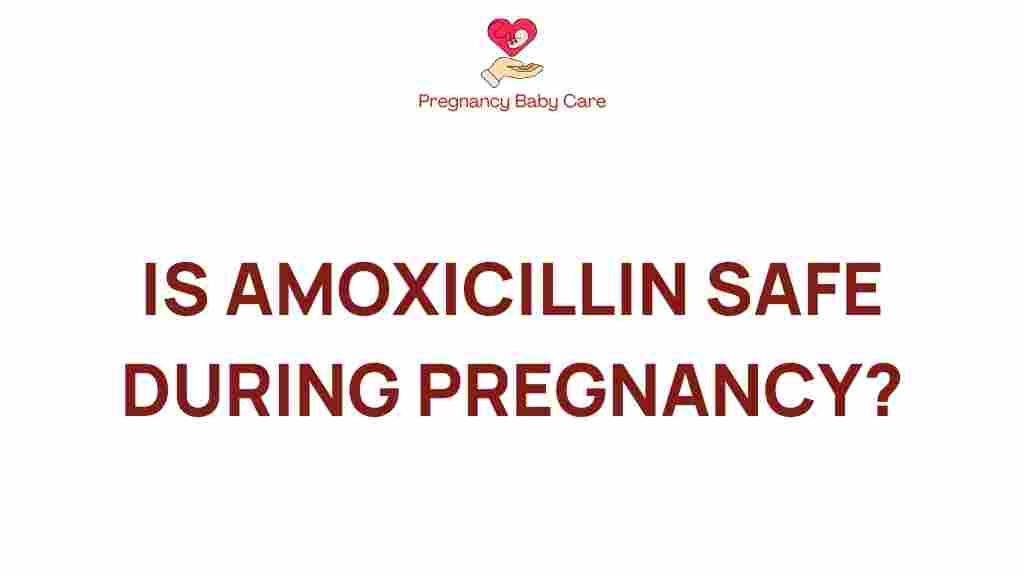Is Amoxicillin Safe During Pregnancy? Understanding Pregnancy Safety
When it comes to pregnancy, the health and safety of both the expectant mother and her developing fetus are of utmost importance. As many women experience various infections during pregnancy, questions often arise regarding the safety of certain medications, particularly antibiotics. One commonly prescribed antibiotic is amoxicillin. This article aims to unravel the truth about amoxicillin, its safety during pregnancy, and what expectant mothers need to know about medication risks.
Understanding Amoxicillin
Amoxicillin is a penicillin-type antibiotic commonly used to treat bacterial infections. It works by inhibiting the growth of bacteria, making it effective against a variety of infections, including:
- Ear infections
- Sinus infections
- Respiratory tract infections
- Urinary tract infections
Before discussing its safety in pregnancy, it’s essential to understand how amoxicillin works and its typical uses. Antibiotics like amoxicillin are crucial in treating infections that could potentially harm maternal health and fetal development.
Pregnancy Safety: What the Research Says
When considering the use of any medication during pregnancy, it is vital to analyze the existing research on its effects on both the mother and the fetus. Studies have shown that:
- Amoxicillin is classified as a Category B medication by the FDA. This means that animal studies have not demonstrated any risk to the fetus, and there are no adequate and well-controlled studies in pregnant women.
- Many healthcare providers consider amoxicillin to be safe during pregnancy when prescribed by a healthcare professional.
- It is generally preferred over other antibiotics that may pose more significant risks to fetal development.
However, it’s crucial for expectant mothers to consult their healthcare providers before taking any medication, including amoxicillin.
Potential Risks of Antibiotics During Pregnancy
While amoxicillin is often deemed safe for use during pregnancy, it’s essential to understand potential risks associated with antibiotic use:
- Drug Resistance: Overuse of antibiotics can lead to antibiotic resistance, making infections harder to treat.
- Gastrointestinal Issues: Antibiotics can disrupt the natural balance of bacteria in the gut, leading to nausea, vomiting, or diarrhea.
- Allergic Reactions: Some individuals may experience allergic reactions, which can be severe.
In rare cases, antibiotics may cause complications, and their effects can vary among individuals. Pregnant women should always discuss the risks and benefits of taking amoxicillin or any antibiotic with their healthcare provider.
Guidelines for Expectant Mothers Considering Amoxicillin
If you are an expectant mother and have been prescribed amoxicillin, consider the following guidelines to ensure your safety and that of your baby:
1. Consult Your Healthcare Provider
Always discuss your symptoms and medical history with your healthcare provider before starting any new medication. They can provide personalized advice based on your specific situation and health needs.
2. Follow Dosage Instructions
Adhere strictly to the dosage and instructions provided by your healthcare provider. Do not self-medicate or adjust dosages without professional guidance.
3. Be Aware of Side Effects
Monitor for any side effects, such as:
- Diarrhea
- Nausea
- Rash or itching
If you experience severe side effects, contact your healthcare provider immediately.
4. Maintain Open Communication
Keep your healthcare provider informed of any changes in your condition or any other medications you may be taking. This information is crucial for managing your health effectively.
Alternative Treatments for Infections During Pregnancy
While amoxicillin is often considered safe, there are alternative treatments and preventive measures that can help manage infections during pregnancy:
- Natural Remedies: Some expectant mothers may prefer natural remedies, such as honey, ginger, or garlic, which can have antibacterial properties. However, always consult your healthcare provider before trying any natural treatments.
- Hydration: Staying well-hydrated can help prevent urinary tract infections and support overall health.
- Good Hygiene: Practicing good hygiene can significantly reduce the risk of infections.
These methods can complement medical treatment or serve as alternatives for those who wish to avoid antibiotics when possible.
Healthcare Advice for Expectant Mothers
Expectant mothers should prioritize their health and the health of their babies by following these healthcare tips:
- Regular Prenatal Care: Attend all scheduled prenatal appointments to monitor both your health and your baby’s development.
- Educate Yourself: Stay informed about pregnancy-related health issues, medications, and safety guidelines.
- Healthy Lifestyle: Maintain a balanced diet, stay active as advised by your healthcare provider, and get adequate rest.
By following these guidelines, expectant mothers can help ensure a healthy pregnancy while minimizing the risks associated with antibiotics like amoxicillin.
Troubleshooting Tips for Managing Infections During Pregnancy
If you encounter difficulties or concerns regarding infection management during pregnancy, consider these troubleshooting tips:
1. Monitor Your Symptoms
Keep track of your symptoms and their progression. If they worsen or do not improve with treatment, consult your healthcare provider.
2. Avoid Self-Diagnosing
Do not attempt to self-diagnose or self-treat infections. Always seek medical advice for appropriate treatment options.
3. Consider Second Opinions
If you are unsure about a prescribed treatment, don’t hesitate to seek a second opinion from another healthcare professional.
4. Utilize Support Networks
Connect with other expectant mothers or support groups to share experiences and gain insights into managing health during pregnancy.
Conclusion: Making Informed Decisions About Amoxicillin and Pregnancy
In conclusion, amoxicillin is generally considered safe during pregnancy when prescribed by a healthcare professional. However, expectant mothers should always consult their healthcare providers before taking any medication, including antibiotics, to ensure the safety of both maternal health and fetal development. Understanding the potential risks and benefits of amoxicillin and following healthcare advice can help expectant mothers make informed decisions. For more information on pregnancy safety and medication risks, consider visiting reputable health sources such as the CDC Pregnancy page.
By staying informed, maintaining open communication with healthcare providers, and prioritizing health, expectant mothers can navigate the challenges of pregnancy medication safely.
This article is in the category Pregnancy and created by PregnancyBabyCare Team
